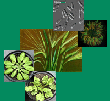| Tennstedt, P; Peisker, D; Böttcher, C; Trampczynska, A; Clemens, S: Phytochelatin synthesis is essential for the detoxification of excess Zn and contributes significantly to the accumulation of Zn, Plant Physiology, 149, 938-948 (2009), doi:10.1104/pp.108.127472 | |
| Abstract: The synthesis of phytochelatins (PCs) is essential for the detoxification of non-essential metals and metalloids such as cadmium and arsenic in plants and a variety of other organisms. No direct evidence for a role of PCs in essential metal homeostasis has been reported to date. Prompted by observations in S. pombe and S. cerevisiae indicating a contribution of phytochelatin synthase (PCS) expression to Zn2+ sequestration we investigated a known phytochelatin-deficient Arabidopsis thaliana mutant, cad1-3, and a newly isolated second strong allele, cad1-6, with respect to Zn homeostasis. We found that in a medium with low cation content PC-deficient mutants show pronounced Zn2+ hypersensitivity. This phenotype is of comparable strength to the well-documented Cd2+ hypersensitivity of cad1 mutants. PC deficiency also results in significant reduction in root Zn accumulation. In order to be able to sensitively measure phytochelatin accumulation we established an assay using capillary liquid chromatography coupled to electrospray ionization quadrupole time-of-flight mass spectrometry (CapLC-ESI-QTOF) of derivatized extracts. Plants grown under control conditions consistently showed PC2 accumulation. Analysis of plants treated with same-effect concentrations revealed that Zn2+-elicited PC2 accumulation in roots reached about 30 % of the level of Cd2+-elicited PC2 accumulation. We conclude from these data, that PC formation is essential for Zn2+ tolerance and provides driving force for the accumulation of Zn. This function might also help explain the mysterious occurrence of PCS genes throughout the plant kingdom and in a wide range of other organisms. |

